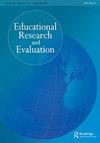Replication is relevant to qualitative research
IF 3.3
Q1 EDUCATION & EDUCATIONAL RESEARCH
引用次数: 13
Abstract
Replication has received increasing attention over the last decade. This comes on the heels of prominent instances of data fabrication (National Academies of Sciences, Engineering, and Medicine, 2017) and estimates that few studies attempt to replicate previous findings (Makel & Plucker, 2014). Replication has been called the Supreme Court of science (Collins, 1985), as well as a basic building block of scholarship. One persistent question in informal conversations that we have not seen addressed in formal writing, is replication’s relevance to qualitative research. Qualitative research is "a situated activity that locates the observer in the world" and "consists of a set of interpretive, material practices that make the world visible" (Denzin & Lincoln, 2011, p. 3). Some have argued that replication “missed the point” of qualitative research (Pratt et al., 2020, p. 3). However, in a survey of nearly 1,500 recently published education researchers, less than 10% of qualitative researchers reported that replication should never be used (Makel et al., 2021). Given the prevalence of qualitative research in education, it is important to examine replication’s relevance. In this commentary, we argue that replication is relevant to the qualitative lens in at least three ways. First, replication supports the established values in qualitative research of transparency and intentionality. Second, replication can be used to assess the well-established tradition of transferability. Third, replication can evaluate connections between reflexivity, as evidenced by positionality statements, and qualitative research findings.复制与定性研究有关
复制在过去十年中受到越来越多的关注。这是在数据捏造的突出例子之后发生的(美国国家科学院、工程院和医学院,2017),并估计很少有研究试图复制以前的发现(Makel&Plucker,2014)。复制被称为最高科学法院(Collins,1985),也是学术的基本组成部分。非正式对话中一个我们没有在正式写作中看到的持续存在的问题是复制与定性研究的相关性。定性研究是“一种将观察者定位在世界中的情境活动”,“由一系列使世界可见的解释性物质实践组成”(Denzin&Lincoln,2011,第3页)。一些人认为,复制“错过了定性研究的要点”(Pratt等人,2020,第3页)。然而,在最近发表的一项针对近1500名教育研究人员的调查中,只有不到10%的定性研究人员报告说,永远不应该使用复制(Makel等人,2021)。鉴于定性研究在教育中的普遍性,研究复制的相关性很重要。在这篇评论中,我们认为复制至少在三个方面与定性镜头有关。首先,复制支持透明度和意向性定性研究中的既定价值观。其次,复制可以用来评估公认的可转让性传统。第三,复制可以评估自反性和定性研究结果之间的联系,正如立场声明所证明的那样。
本文章由计算机程序翻译,如有差异,请以英文原文为准。
求助全文
约1分钟内获得全文
求助全文
来源期刊

Educational Research and Evaluation
EDUCATION & EDUCATIONAL RESEARCH-
CiteScore
3.00
自引率
0.00%
发文量
25
期刊介绍:
International, comparative and multidisciplinary in scope, Educational Research and Evaluation (ERE) publishes original, peer-reviewed academic articles dealing with research on issues of worldwide relevance in educational practice. The aim of the journal is to increase understanding of learning in pre-primary, primary, high school, college, university and adult education, and to contribute to the improvement of educational processes and outcomes. The journal seeks to promote cross-national and international comparative educational research by publishing findings relevant to the scholarly community, as well as to practitioners and others interested in education. The scope of the journal is deliberately broad in terms of both topics covered and disciplinary perspective.
 求助内容:
求助内容: 应助结果提醒方式:
应助结果提醒方式:


